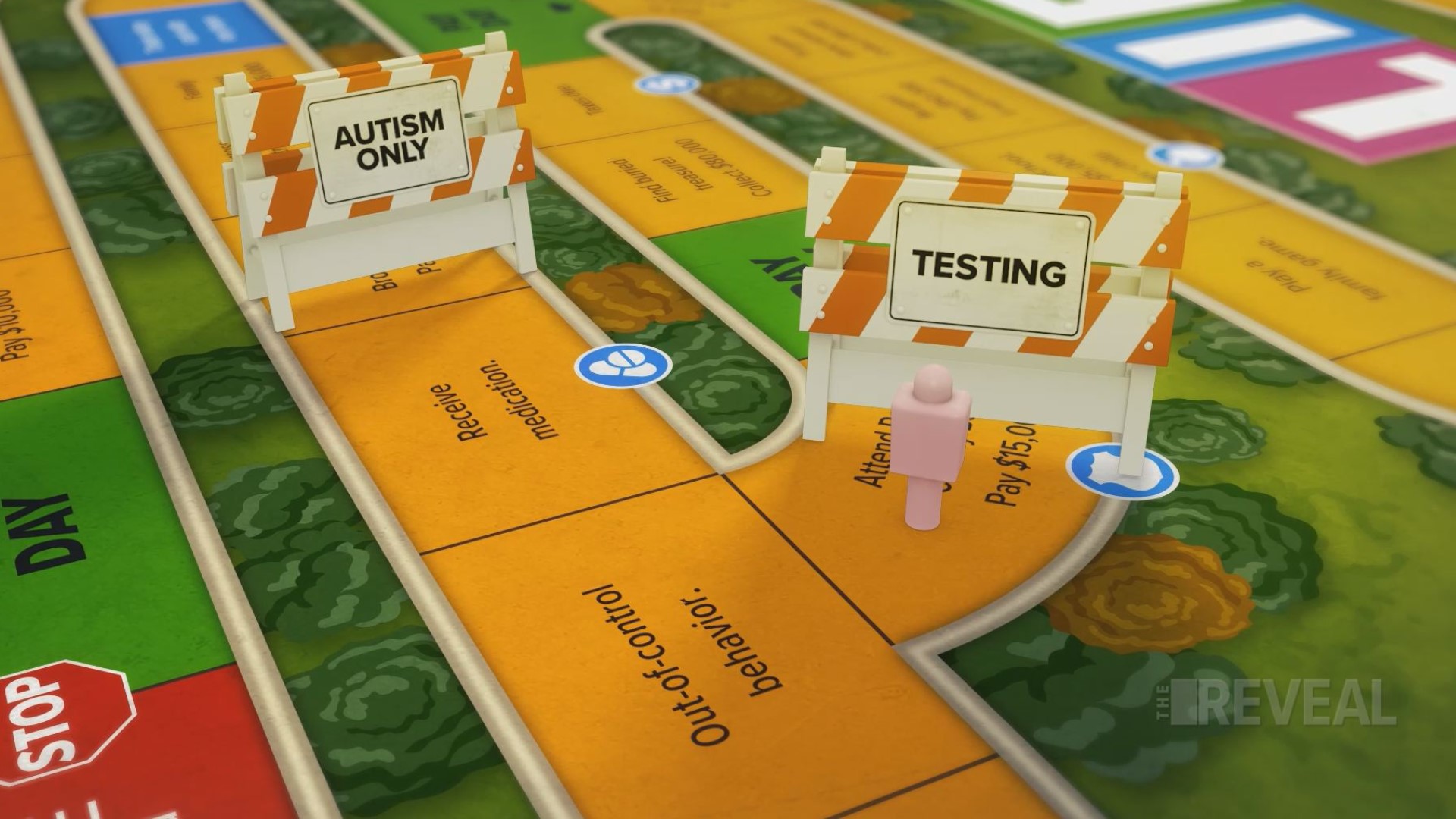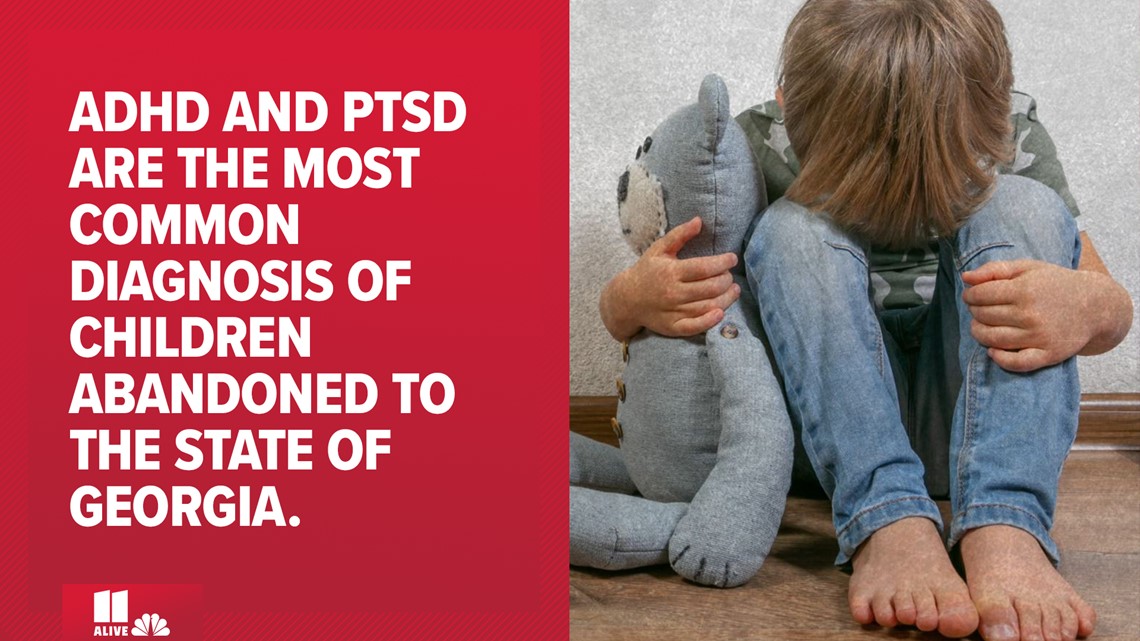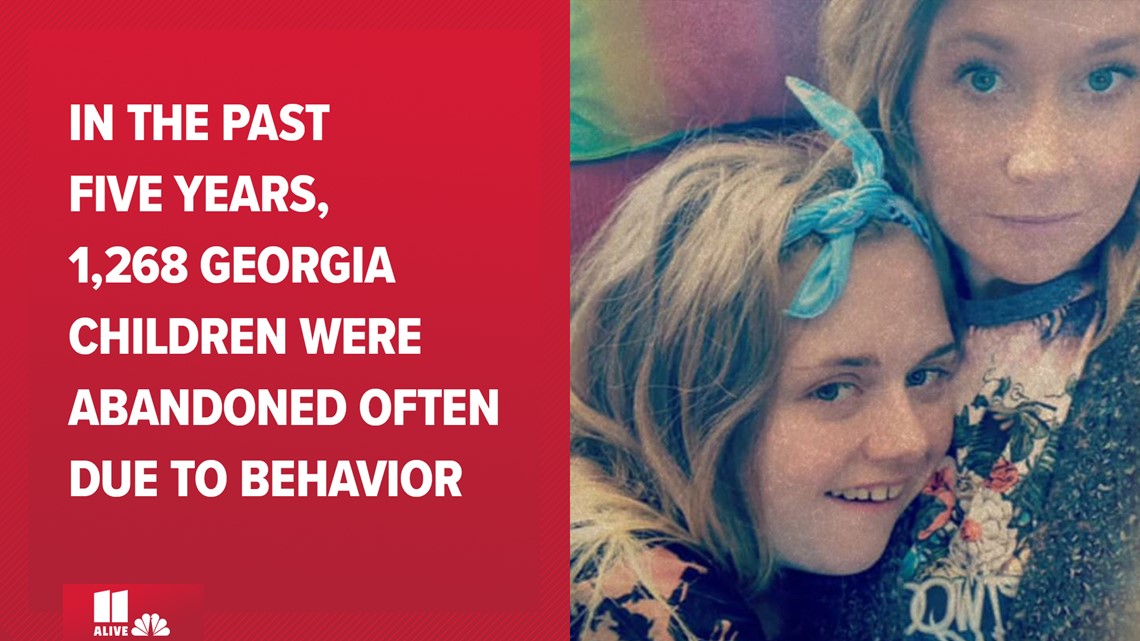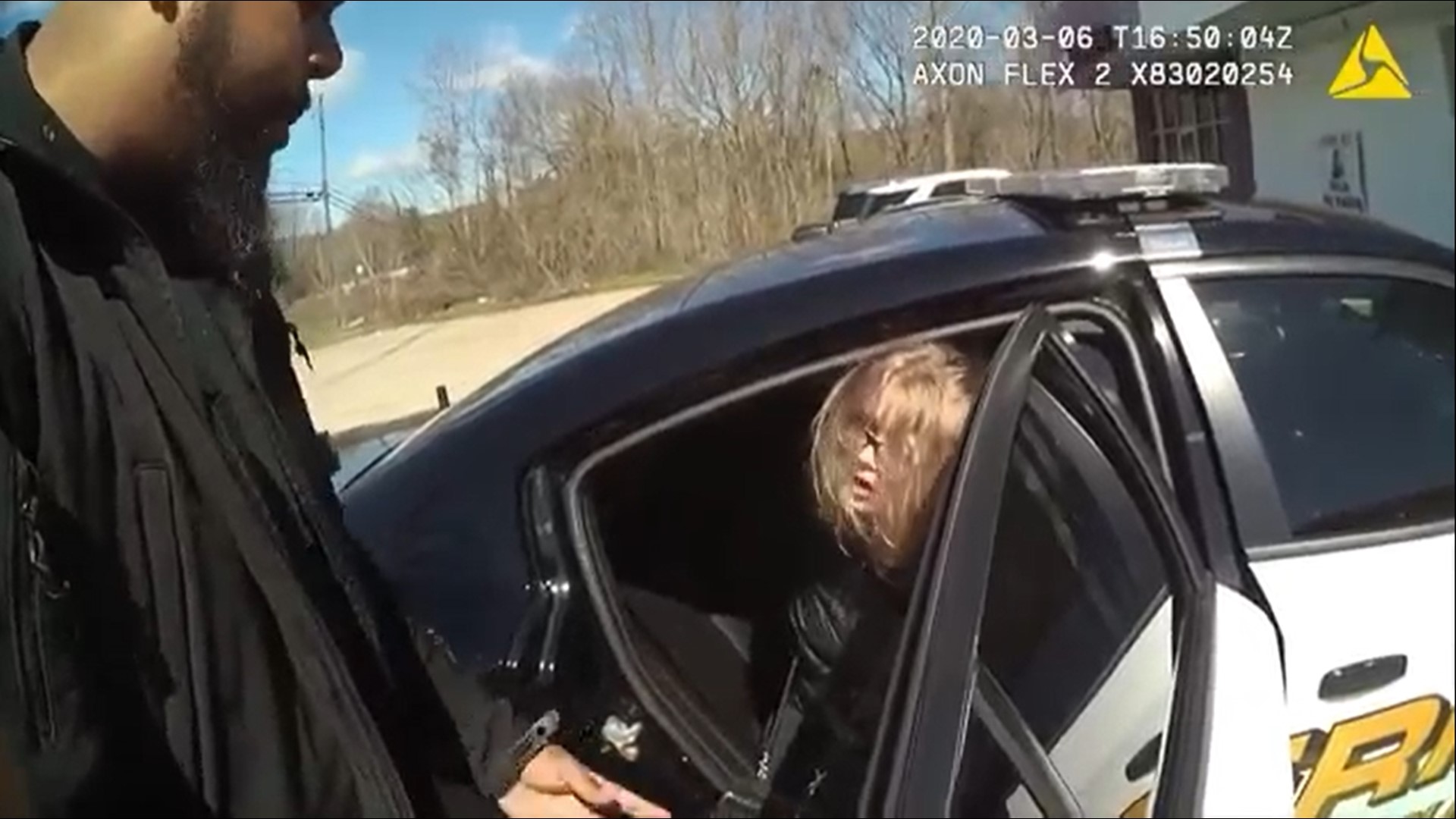Homeless. Jail. Sexually exploited. The Game of Life never talked about this.
11Alive investigative series exposes the gaps in Georgia's mental health care system that cause thousands of children to be surrendered to state custody.

It's been called "trading custody for care" and even a "passport to services" - the decision to turn custody of your child over to the state.
It sounds cruel. But listen to the stories of those who have done it, and you'll quickly realize it is often a heartbreaking act of love.
The families confronted with this decision may be out of ideas for how to keep their children with autism safe as they violently fling their bodies against a wall. Parents struggle as children with dual diagnoses like impulse control disorder and intellectual disability wander out their door and into the arms of child predators.
The stories are real. For parents navigating programs that try to help, looking for the one that will actually make a difference, it is exhausting.


As part of a data fellowship with USC Annenberg Center for Health Journalism, 11Alive's investigative team, The Reveal, wants to show how the challenges of raising children with severe emotional and developmental disabilities can lead to abandonment.
In the past five years, 1,268 Georgia children were abandoned or surrendered due to a parent's inability to cope or the child's behavior. More than half of those children were surrendered twice - either abandoned again by their parents, another family member, a foster parent, or an institution that thought it could help.
These are their stories.
#KEEPINGTREY
“My teacher called DFCS and told them that my arm was burnt,” Trey said, recalling his early years before bouncing around from relatives, a foster family, and a group home.
Trey was five when he came into DFCS custody. Between the abuse, bouncing around and a mild intellectual disability, Trey didn't just need housing and love, he needed behavioral therapy.
Trey has experienced traditional foster care and therapeutic foster care. When asked what’s different he responds, “I get the help that I needed,” adding his recent successes likely wouldn’t have happened if it weren’t for the program.
Georgia lawmakers approved $6.7 million in funding this year to expand TFC. Children in state custody and those at risk of being abandoned, who can show such a program is “medically necessary," would be included.
According to a spokesperson with DFCS, the money currently allocated can serve about 500 youth. The division hopes to grow the program in the next few years to double that number.
RELATED: Teen finds team to score touchdown in life: How new DFCS program could prevent child abandonment
CHILDREN IN HOTELS
During this investigative series, The Reveal learned about Georgia's practice of putting children in hotels until they can find them a bed in a more appropriate setting, usually a Psychiatric Residential Treatment Facility, or PRTF. While being in a hotel, the children are supervised 24/7.
In 2019 – DFCS paid to house more than 600 children in hotels – most of them teenagers with intellectual disabilities and significant behavioral concerns. The cost? Roughly $1,400 a day. That’s nearly four times as expensive as a treatment facility and five times more expensive that TFC.
“Money doesn’t solve things. What solves things is the right amount of money plus the right service at the right time,” former DFCS Division Director Tom Rawlings said.
#KEEPINGKAYLEIGH Kayleigh's story
Kayleigh was born with multiple mental and physical disabilities. Early on Christina Henry knew something was wrong.
“She would projectile vomit across the room, and just kind of sometimes she would like seize in my arms and kind of her eyes would roll back,” Henry remembered.
Doctors believed the seizures were caused by a Chiari malformation, which essentially meant her brain was too big for her skull. Two surgeries addressed the deformity, but Kayleigh’s developmental delays and behavioral issues continued to get worse.
By the time Kayleigh was a teen, she’d been diagnosed with an intellectual disability, mitochondrial disorder, leaky gut, Oppositional Defiant Disorder, ADHD, and PTSD – just to name a few.
It also means Kayleigh is impulsive, has had fits of aggression, and a habit of running away. The last time she ran away, her mother found her malnourished, covered in bruises, with signs of rape and human trafficking.
Christina said it was after Kayleigh tried to kill herself – overdosing on two medications meant to treat depression – that the mother became desperate.
Believing the state could help her daughter access better treatments, she gave up custody.
“Never did I want my child to leave my home. I just wanted help. I just needed that village. And it was awful. It was such a traumatic experience. I just felt like I failed her," Christina explained.
Kayleigh, now 19, has returned home. Ironically, her mother has gone to court to win guardianship over her now-adult daughter, to remain an advocate in her medical care.
Kayleigh's struggles remain the same, except now she is at an age where treatment is even harder to get approved.
#KEEPINGKAYLEIGH Two confrontations, different outcomes
You can learn a lot by watching an officer’s body camera video. We wanted to know what happened in 2019 when Kayleigh, an 18-year-old with autism, ended up in a Newton County jail after refusing to leave a gas station parking lot.
Sitting on a park bench months later, I asked Kayleigh, “How was jail?” Her response was simply, “It was not good.”
But knowing she doesn’t want to go to jail, doesn’t seem to stop Kayleigh’s behavior. She’s spent time in three county jails in two years for offenses related to disorderly conduct.
“When I’m mad, I’m not going to be quiet. You’re not going to silence me,” Kayleigh said.
The past few months, many have been moved by Kayleigh's Story as we’ve tried to explain the gaps in our behavioral and mental health system that leads some parents to abandon their children to state custody.
Kayleigh has autism, developmental disabilities and behavioral problems that make it impossible for her to live alone and be vulnerable to predators. The world’s rules on how to behave don’t come naturally and her mom says until now, therapies that could help, have been denied by Medicaid.
“It’s truly unfair for these children,” her mom, Christina Henry said.
As a result, Kayleigh has a tendency to run away. On the streets, she’s been the victim of sexual exploitation and rape. She has been homeless and she has come into contact with police again and again.
Two separate incidents show how police officers handle an escalating situation caused by a mental health crisis can make a big difference in the outcome.
That’s why we were able to obtain body camera video showing two different calls to Newton County’s 911 – with two very different outcomes.
#KEEPINGKAYLEIGH The risks
Kayleigh's story shows that abandonment, homelessness, and arrests aren't the only risks.
There’s no statistic on how many dually diagnosed teens end up sexually exploited, but Katina Hall, a therapist at Wellspring Living says it is definitely an instigator.
“That need for love, attention, and acceptance. That need for validation. Those are the primary keys that will call that young lady to that trafficker. And traffickers are smart in that way,” Hall said.
Indeed, it was Kayleigh's trusting nature and desire for companionship that put her in harm's way.
BY THE NUMBERS
About 40% who come into Georgia's care through forms of abandonment are teens, according to data from the Division of Family and Children Services (DFCS).
Depending on who has custody of the child, there are potentially four different state agencies involved in providing care: the Departments of Community Health, Behavioral Health and Developmental Disabilities, Education, and DFCS.
Between them, parents argue, there’s little to no case management looking at the big picture. Just as frustrating, the child’s primary diagnosis – like bipolar disorder or autism – can greatly limit the type of services and support available.
Of the children with a diagnosis listed, 58% have severe behavioral or mental health challenges, 40% have a developmental disability. More than a third come into care with both.
#KEEPINGBRADLEY
A non-verbal teen with autism sits in a residential treatment facility four hours away from home.
“I thought, this is going to be a couple of months and he’ll come back and we will have a plan on how we can help him on the daily, how I can help de-escalate and things of that nature,” April Bonaccorsi explained.
But two years later, she said her family still has none of that, despite the fact Medicaid insists that level of care is no longer a medical necessity. And it probably wouldn’t be if Bonaccorsi could find local therapists trained and willing to work with 14-year-old Bradley at home.
Unable to use words to communicate his feelings, he often speaks through aggression.
“He would wrap his whole body around your legs and bite you. And it would be to where for a year I had a piece of flesh that was just misshapen on my leg. He’s just very, very strong,” April explained.
For years, she tried to get Bradley behavioral therapy, but all she received was a slot on a waiting list. Georgia covered the service, but there weren't enough therapists available.
That’s how Bradley ended up at Springbrook Autism Behavioral, a treatment facility in South Carolina.
The Americans with Disabilities Act requires that people receive care in the most integrated setting. That means, if Bradley can be treated in the community instead of a residential treatment facility, then he should be. And it's the responsibility of the state to make sure that care is accessible to him.
April reached out to the Georgia Advocacy Office when she felt pressured by Medicaid to bring Bradley home regardless. When she pushed back, she said her insurance offered a solution.
“Well, you can give up partial custody to DFCS and then he’ll get the resources that he needs," April recalled.
She never did give up custody, and the Department of Community Health has agreed to extend his stay at Springbrook while they search for therapists to work with him at home.
But as the fight for state services continues, Bradley may not receive the in-home kind of support he needs until he becomes an adult.
SYSTEMATIC BLOCKS
One challenge is that doctors don’t always know how to express the supportive services that help keep the child healthy. It’s clear what medications or treatments might aid a physical disability, but behavioral therapies and in-home aides to help with bathing and quality of life are often not considered.
“What we see all the time is children with a more complicated diagnosis, or multiple diagnoses, fall in what I call the Grand Canyon of service gaps. Because the service systems have a hard time working together,” said Susan Goico, the Director of the Disability Integration Project at Atlanta Legal Aid.
The state knows needs are not being met. It is a state agency, DFCS, that wrote a 9-page memo outlining some of the problems. In the past two years, child advocates, attorneys and behavioral health providers have also written letters to the Department of Community Health listing specific steps that could help. One group called the current system “incoherent.”
But improving the system will require creative incentives to bolster the state’s mental health workforce, especially in rural areas.
Parents say we also need to take a close look at what health insurance – both commercial and managed care – provides. Voices for Georgia’s Children is currently studying denials within the Medicaid system to find out why families are failing to get access to services.
Even parents who get approved for services sometimes fail to access them, either because of limited hours of availability or no providers in the areas where they live.
And just about every group that has studied this issue says we need to enforce parity, essentially equal access to mental and behavioral health services as is provided for physical medical conditions.


#KEEPINGJAYLEN
When Jaylen rocks a stair banister, it breaks. When he repeatedly jumps on his bed, the metal frame bends. But his mom Maria doesn’t know how to stop him or what he’s trying to communicate when he does these things.
The 17-year-old has autism.
Maria remembers a few years back when he started to physically injure himself. Even then, there was no way as a single working mom that she could watch him 24 hours a day.
“I said if you guys don’t help him, I’m at the part where he’s just going to get dropped off at Children’s. And I meant it. Did I want to do it? No,” Manning said, fighting back the tears. “I felt it was the only way I could get some help for him.”
Jaylen is a good example of the problem with getting government approval for services - but lacking access. He was approved for behavioral therapy to help him find better ways to communicate. But when Jaylen was younger, Maria couldn’t juggle the limited appointment times with the hours of her job. Now that she’s working from home, therapists say at 17 he’s too old.
While there are likely therapists that would work with Jaylen, Maria hasn’t found them.
“I love my son. I love him so much but it’s like am I the best thing for him? Some days I don’t feel that way," she said. "What is he learning from me? How am I helping him? What can I do? I feel helpless. I’m his advocate and I feel helpless."
#KEEPINGJACOB
It’s not a ranking to be proud of. According to Mental Health America, Georgia ranks 51, the absolute last in the nation when it comes to access to mental health care.
The Austin family is living the reality of what that ranking means. Earlier this year, they agreed to give up custody of their son Jacob, in exchange for the residential behavioral therapy he needs.
That’s a tough concept for Jacob, a 16-year-old who doesn’t know what to do with his emotions but does know he loves his parents, Amy and Chad. He also needs to know ‘he’ is loved too. His mother remembers the phone call when she had to share the news with Jacob.
“He broke down completely. He sobbed. He cried and cried and cried. And he said, ‘does this mean you don’t want me anymore?’”
#KEEPINGAVA
Ava Bullard is no stranger to Georgia’s Capitol. For seven years, Ava and her mother Anna showed up to testify before legislative committees and lobby in the halls. She is the namesake of Ava’s Law which passed in 2015, mandating insurance provide coverage to children for treatments associated with autism.
“It’s just weird being here when it’s empty,” Ava said as she walked the halls again. Six years have passed. She’s no longer a little girl. She’s a senior preparing to head off to college. Her mother stands beside her, beaming with pride.
Her mom remembers when Ava was diagnosed as a toddler with autism.
“She was non-verbal, she had no skills when she was 2.5 years old. No feeding skills, play skills. The shocking part was none of the services that were prescribed by the physician were covered by insurance or Medicaid,” her mother said.
But Ava’s parents knew intervention at a young age could make a difference.
#KEEPINGSHELDON
Diana Elliott admits she did something drastic but says she didn’t abandon her son at Grady Hospital. She left him with a note.
Elliott says it included his name, birthday, and a simple message: my mom needs help.
The problem, nobody found that note and Sheldon, who has Down syndrome, is non-verbal.
“I didn't take it to account he could drop the letter, roam out of the door, roam out in the cold,” explained Elliott, reflecting back on her decision.
Sheldon’s mom waited nervously in a motel room with her three other children for an entire week. Her children grew restless wondering what was going on.
“I'm thinking, oh, they're going to call me. They're going to say, ‘she needs help’ and they are going to come help,” she said.
ABOUT THE DATA: We asked for data on all of the children that came into DFCS custody from 2016 to 2020 for abandonment, relinquishment, child behavior, and inability to cope. There were more than four dozen diagnoses associated with those children. We categorized those diagnoses into developmental, mental/behavioral, and medical for our analysis.
This story was told as part of a 2020 Data Fellowship with the USC Annenberg Center for Health Journalism.
The Reveal is an investigative show exposing inequality, injustice, and ineptitude created by people in power throughout Georgia and across the country.
MORE FROM THE REVEAL:
Cancer causing chemical found in Ga. drinking water remains unregulated five years after EPA warning


